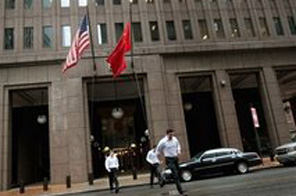Bailed-out Goldman Sachs sees profits soar
NEW YORK: Wall Street giant Goldman Sachs shattered forecasts with 3.44 billion dollars in quarterly profit after paying back a US government bailout, suggesting the financial crisis is easing.
Goldman, which reimbursed a 10-billion-dollar federal bailout in full in the second quarter, said its net profit soared 65 percent thanks to robust trading operations.
The prestigious financial firm is the first of the "big guns" in the sector to report second-quarter results. Rounding out the week is JPMorgan Chase on Thursday, followed by Bank of America and Citigroup on Friday.
Investors are keenly awaiting the round of quarterly results to see whether massive public aid and better conditions in the stock market have positioned the ailing sector for recovery.
Goldman reported earnings per share of 4.93 dollars, besting analysts' forecasts of 3.54 dollars.
"While markets remain fragile and we recognize the challenges the broader economy faces, our second-quarter results reflected the combination of improving financial market conditions and a deep and diverse client franchise," chairman and chief executive Lloyd Blankfein said in a statement.
Goldman, the last of the major Wall Street investment banks left standing after the financial meltdown late last year, said that excluding its payback of government aid under the Treasury's Troubled Asset Relief Program, it had earnings per share of 5.71 dollars.
The 700-billion-dollar TARP was launched as the global financial crisis accelerated after the collapse of rival Lehman Brothers in September. The government poured taxpayer funds into the financial sector in an effort to unblock frozen credit and pull the economy from the worst recession since the Great Depression.
Last month Goldman was among 10 major US banks repaying the Treasury for the capital injections, in a sign of a stabilizing financial system.
A number of firms were eager to get out from under the TARP, in part to escape federal scrutiny of executive compensation.
Goldman repurchased the 10 billion dollars in preferred shares taken by the government and paid a dividend of 425 million dollars.
As expected, trading was the key profit driver for the investment bank, which converted to a commercial bank amid the financial meltdown last year to gain access to Federal Reserve resources.
"Goldman Sachs is living up to every bit of its expectations on how it is routinely and systematically taking money out of the markets in its trading activities," said Jon Ogg of 24/7WallSt.com.
During the quarter, the Dow Jones Industrial Average put in its best performance in six years.
For Charles Geisst, a finance professor at Manhattan College, the consolidation of the financial sector amid the crisis has been a boon to Goldman.
Fewer competitors exist today, he said, "allowing them more latitude in trading and underwriting."
"Also, their appetite for risk never diminished and as a result, they were able to take advantage of the market which has some distinct bargains in it. They may not be that successful in the future, however, if the competition returns."
The Standard & Poor's ratings agency raised concerns about Goldman's dependence on "a highly favorable trading environment."
"Although GS may well continue outperforming its close peers, we don't consider its first-half results to be sustainable," S&P analyst Scott Sprinzen said.
"Moreover, we continue to have concerns about the confidence sensitivity of securities firms with sizable trading operations and high reliance on wholesale funding, despite this strong recent showing," Sprinzen said.
Goldman's gold-plated earnings came as investors fretted about embattled CIT Group, a major player in industrial loans.
CIT, which operates in more than 50 countries and provides financial services to small and medium-sized businesses, is seeking fresh government aid to avoid collapse.






